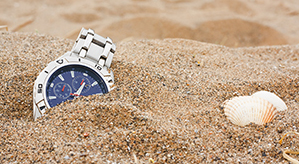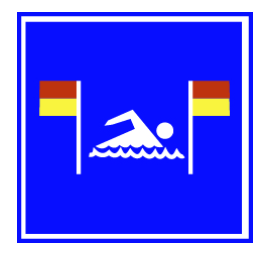Beach safety
Our beaches at Bondi, Bronte, and Tamarama may look picture-perfect, but with drownings on the rise, you must follow our simple safety advice to keep you and your loved ones safe.
Top tips from Waverley's Lifeguards
- Swim during patrol hours.
We have the longest patrol hours in Australia, between 6 am and 7 pm every day throughout summer, giving you plenty of time to safely enjoy our ocean. Once the lifeguards leave the beach, it’s time for you to get out of the ocean. - Swim between the flags.
Whether you’re dipping, swimming or bathing, stay between the red and yellow flags - that’s where it’s safest for you to be. Bonus points for getting in with a friend. - Float to survive. If you get into trouble whilst you’re in the ocean, don’t panic or wave, just float. You can’t fight a rip, so follow these simple steps instead:
- Tilt your head back
- Try and breathe normally
- Move as little as possible
- Call out for help
- Continue to stay calm and float until help arrives
Smoking and alcohol are not allowed on the beach. For more information, see alcohol free zonesThis external link will open in a new window.
What to do if you get caught in a rip
Learn what a rip is and how to spot a rip current in this video from Surf Life Saving AustraliaThis external link will open in a new window.
Safety signs
Please be sure to read safety signs before entering the water.
|
|
| ||
| Warning – shark sighted, enter water at own risk | Dangerous current – swimming not suggested in this area | Danger! Beach closed – swimming not suggested | ||
|
|
| ||
| Warning – bluebottles (stinging jellyfish) in this area | Hard surf craft prohibited in this area (surfboards, surf skis, surf kayaks) | Beware of shore break | ||
| ||||
| Swimming area – swim and bathe between the red and yellow flags |
Beach safety signage competition
Council is committed to ensuring everyone who visits our beaches is kept safe. In 2025, Waverley Council invited the community to come up with an interesting new design for a beach safety sign, reimagining the ‘Swim Between the Flags’ or ‘Dangerous Current’ signs. The winning design, created by Charlie Bennell, will be submitted to Australian Water Safety Council, Surf Life Saving Australia and the Royal Life Saving Society Australia for consideration to be formally used as part of national warning and educational water safety signage. Find out more here.
Rock fishing
Rock fishing is a dangerous pastime. If you choose to go rock fishing, you run the risk of slipping on rocks or being swamped by waves and swept out to sea. Fishing spots can be a long way from help and are often difficult for emergency services to access, so if you choose to go out, you must be prepared and understand the risks.
No matter what your skill level is, be sure to follow these guidelines to stay safe:
- Always wear a lifejacket.
- Check weather conditions and updates before heading out.
- Wear non-slip footwear.
- Never fish alone and always tell others when and where you are going.
- Carry a mobile phone or Personal Locator Beacon (PLB) with you at all times.
For more information on how to go rock fishing safely, watch the below video and check out the resources at the end of this page.
Surfers’ code
The beach is a shared space for everyone. If you are learning how to surf, or are new to the area, follow these tips for staying safe in the surf:
- Respect everyone: Respect everyone in the surf. This includes swimmers, paddle boarders, body boarders and others surfers. Be mindful of those around you.
- Don’t surf between the flags: Surf away from the red and yellow flags. These areas are for swimmers.
- Don’t drop in: The surfer on the inside, closest to the breaking part of the wave has right of way.
- Paddle wide: When paddling out, stay wide – away from others catching waves.
- Communicate: Tell other surfers and swimmers near you which way you're going on a wave.
- Hold on to your board: Don't let go of your board if possible, doing so can endanger others.
- Surf within your abilities: Know your limitations and surf within your ability.
Always check safety signage at the beach before heading out. If you’re in doubt about the conditions or where to surf, talk to the lifeguards on patrol. |
P.S. Don’t be a tosser.
We share our home with beautiful marine animals, and we are responsible for protecting them from harmful waste. So please leave the beach how you found it, which means taking your rubbish with you.
Useful resources:
- Check the Bureau of MeteorologyThis external link will open in a new window for NSW and Sydney metro weather forecasts.
- Visit Float to Survive AustraliaThis external link will open in a new window to find out more about this campaign supported by Waverley and Randwick Councils.
- Read the Council for Intellectual Disability’s Summer Safety: Beach and sun safetyThis external link will open in a new window easy read guide.
- For tips on how to fish safely (including off the rocks), visit the NSW Government’s rock fishing safety pageThis external link will open in a new window, the NSW Department of Primary Industries’ fishing safelyThis external link will open in a new window page and SafeFishingThis external link will open in a new window for translated resources.
For more information, email our Customer Service Centre at info@waverley.nsw.gov.au or call 9083 8000.
Want updates?
Subscribe to Waverley Weekly
Subscribe now
Lifeguard patrol hours
High season (October to April):
6am–7pm, Monday to Sunday
Low season (May to September):
7am–5:30pm, Monday to Sunday
Lost property

Have you lost something on our beaches, parks or streets? Report it here and we’ll let you know if we find anything!
Please note, you will only receive a response if your item is located.
Quick links







